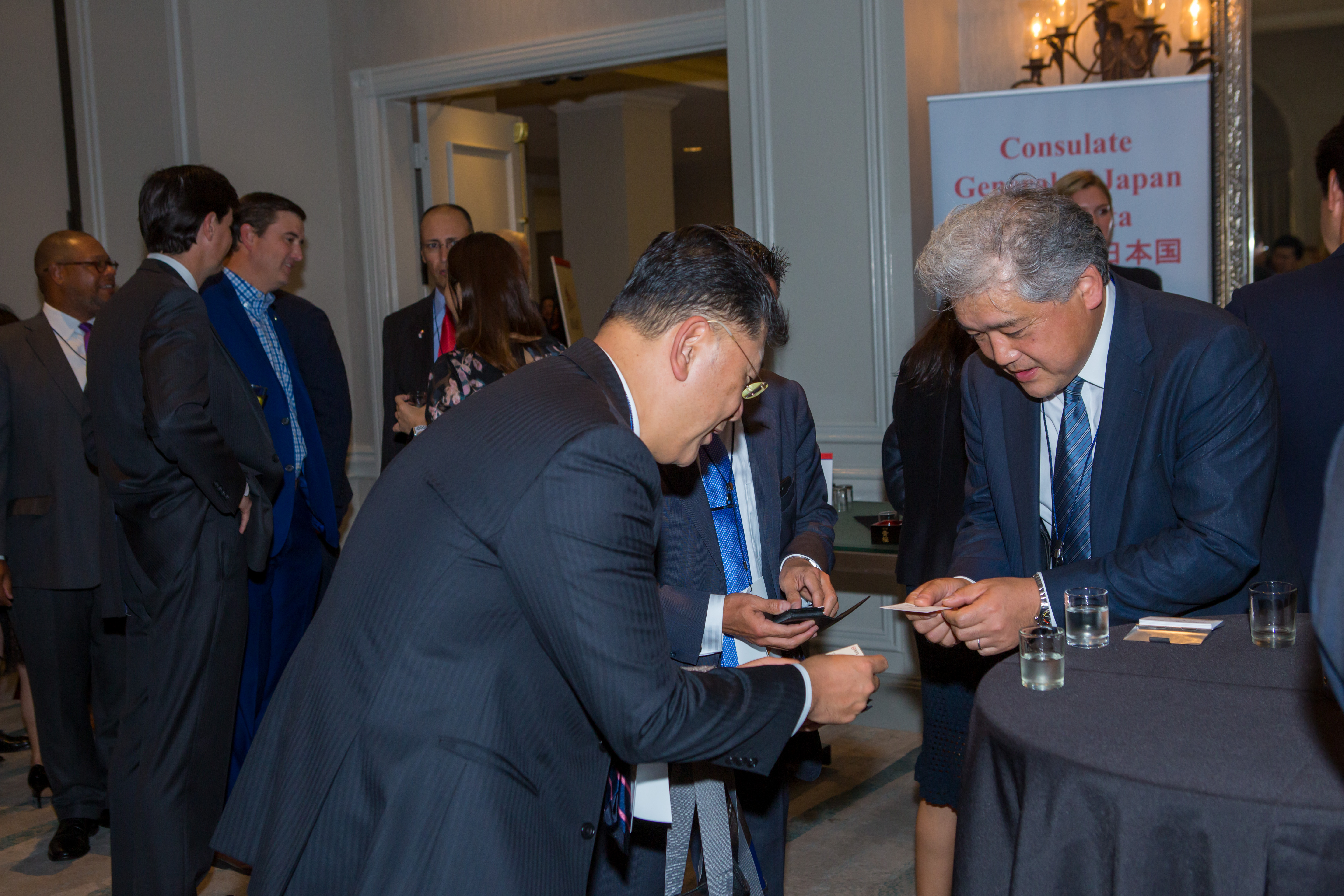International Representative Spotlight: Japan

International Representative Spotlight: Japan

Interviewee Name(s) & Title(s):
Joseph Huntemann, Managing Director
Japan is not only one of the U.S.’s most reliable trading partners, it is the world’s 3rd largest economy and Georgia’s 6th largest trading partner. In 2021, Japan was also the 7th largest importer of goods from Georgia. Japan serves as an ideal entry point to Asian markets, especially for experienced exporters. The Georgia Department of Economic Development has maintained representation in Japan since 1973 and Atlanta has hosted a Japanese consulate since 1974.
Where is the office based?: Tokyo, Japan in the Toranomon district
Who are the team members?: Joseph Huntemann and Yuumi Mochizuki
How did you enter the world of exporting/trade and how long have you been working in this field?
Joseph: This role is my first foray into export promotion, but I have some experience in the trade world. Before I came on as Managing Director, I worked as a Project Manager in GDEcD’s Global Commerce division, which primarily focuses on support to existing industries and facilitating foreign-direct investment (FDI) to Georgia. As a Project Manager, I was brought into most conversations that involved working with the Japanese. As a result, I’ve worked with and supported the Trade team extensively, especially with SEUS Japan, where I focused on helping to promote Georgia and facilitate B2B interactions between Georgian and Japanese companies.
The Japan office itself was started back in 1973 under then-Governor Jimmy Carter, with a primary focus on FDI; it has not historically worked a lot with export promotion. Consequently, you could say both the Japan office and I are relatively new to supporting Georgia exporters; however, one of my goals as Managing Director is to support exporters much more than in the past.
What typical services do you provide for Georgia exporters interested in Japan?
J: The main way we support Georgia companies right now is helping to familiarize them with the Japanese market and beginning the initial steps that will prepare them to export there. I am working on expanding our network of in-country contacts, including with the Japan External Trade Organization (JETRO) and the main economic business forum in Japan, the Keidanren. My hope is that these contacts will help companies navigate regulations, distribution queries, networking, and more, which will ultimately get their products onto shelves in Japan. While we work to build out this network, we can consult companies on marketing strategies by giving them foundational knowledge and assisting with preparation. If something gains traction or I have an existing contact that can help with something specific, then we’re also happy to get them going down that route.

What do you consider the biggest challenge(s) to exporters interested in Japan?
J: The biggest challenge is to understand what will succeed in Japan and how to market there. In many countries, so long as you have your product, an in-market contact, and English materials that can be translated, you can dive in head-first. Japan doesn’t work that way. It is a relationship-focused market that takes time to enter. You have to establish a good network at the beginning to have a shot at success.
Certain products may also face challenges entering the market. Companies can’t compete on volume or price and probably won’t have instant pickup or recognition of their product. To succeed, you really need to make Japanese consumers feel like you’re speaking to them. It can be a challenge to do this because there a lot of differences and cultural nuances that companies need to consider. It takes more time to enter Japan than most other markets, and that time commitment can be a hard sell for some potential exporters.
What is the greatest opportunity for exporting to Japan?
J: Premium and luxury products all have a great opportunity to succeed in Japan, regardless of what the specific product is. If a product is of high quality, can sell at a high price, and/or can’t be bought from anyone else, exporting it is worth consideration. Companies won’t win based on volume, quantity, or price, so any sales will be based on your product’s uniqueness and quality, as well as your work in brand building. If you do your research, prepare for the market, and understand best practices for selling here, it will be easier to find opportunities to succeed in Japan.
That being said, some products may have an easier time finding footing in Japan. For example, software and technology is a good opportunity for exporters. Japan tends to have a “hardware-focused” mindset; however, the U.S. leads in IT and cybersecurity. Georgia is strong in these industries. Exporting software is a whole different animal than what we generally think about with exporting, but it has strong potential to succeed if you have a technology that the other side can use to fill gaps in existing offerings.
Another example of a great opportunity is American beef. Japan doesn’t have the land mass to raise cattle on a large scale like we have in the U.S. While Japan does raise some cattle, it is very expensive. Japan’s other option for importing is Australia, but Australian beef is grass fed so it’s more gamey and less flavorful; American beef is grain feed, so it has a more flavorful taste that doesn’t cost exorbitant amounts like Wagyu and other Japanese domestic alternatives.
How would you describe the trade relationship between the U.S. and your market?
J: Japan and the U.S. have an extremely secure trading relationship that has flourished since the end of World War 2. Japan is America’s fourth largest trading partner, surpassed only by Canada, Mexico, and China. Trade between the U.S. and Japan is fairly lopsided, with the U.S. importing far more from Japan than exporting to them. Since World War 2, Japan has been an export-led economy and has primarily sold finished goods like machines and equipment to the U.S. Historically, the U.S. has exported primarily agricultural products to Japan, but more recently, we have started exporting more software and technology. Despite these recent developments, our primary imports from Japan remain value-added and finished goods and our primary exports remain commodities and agricultural products.

Are there any trends, be it in policy, culture, or consumption habits that exporters should be aware of when considering the market?
J: Japan is the third-largest economy in the world, but one consideration should be its demographic trends. Like many developed nations in recent years, Japan is a “graying,” shrinking market. The changing demographics have other market impacts, such as a growing number of opportunities in the medical and medical device fields. Health-oriented agricultural or other processed products, such as probiotics and supplements, may also do well. Additionally, if your company is in the senior care market and manufactures or holds patents for unique technologies, Japan is worth considering as an export market.
It is also important to consider the international political environment when you enter a new market. Take the Trans-Pacific Partnership (TPP), for instance. TPP was a proposed free trade agreement and the US joined negotiations in 2008; however, the US ultimately withdrew from it in 2017. Business eventually continued as normal after our withdrawal, but it’s important to understand how things like that can affect business outcomes.
What advice do you have for companies looking to start exporting to your market?
J: Before trying to enter Japan, companies should have all of their marketing collateral properly translated – ideally by a native speaker. Translated materials frequently do poorly in Japan because of linguistic nuances that native speakers more easily notice. Companies should understand that the language and design used for marketing in Japan is very different than that used in the U.S. To be frank, a lot of marketing material that is well-received in Japan likely would not resonate with western consumers, and vice-versa. It is key to make Japanese consumers feel like you’re speaking to them, which means marketing in a way to which they are accustomed. To do this, it is fundamental that your translations are top-notch. Otherwise, you run the risk of miscommunicating your brand and demonstrating lack of professionalism.
Your product also needs to be unique. Japanese consumers aren’t going to opt for a Georgia or U.S. product if there’s a domestic alternative. Because of this, many products won’t have success in Japan. However, if you have something unique or you can put a unique spin on it, and you’re able to communicate that distinction well, then you could have a good shot at success. Georgia produce (that can only be found in Georgia), unique technologies, and new software are all examples of products that could find footing in the Japanese market.
Another piece of advice would be to do your research and make sure you have a successful market strategy. It isn’t particularly effective to just go to a trade show or event and expect that there will be automatic success. Face-to-face interaction is very important to Japanese businesses, which is part of the reason why business has slowed down more in Japan than elsewhere. Understand that Japanese companies are also not as comfortable with business purely in a transactional mindset: they want to partner with someone with whom they’ve established a relationship, over the long term.
My biggest advice is to take an initial trip to scout things out and learn about opportunities and regulatory hurdles you might face. You probably won’t come back with agreements in hand, but it’s almost a necessary first step. We can connect you with JETRO, the Georgia Ports Authority’s office in Japan, and some of our other partners for these types of visits.
If possible, look at your market entry through a luxury item lens – can you sell your product in a high-end store, hotel, or other established presence with a recognizable brand? If so, that has potential as a market entry point. You could start as a private label on Japanese shelves or contract with a company that distributes for you. Depending on your product and distribution channel, you could also enter into partnerships with retailers. If you can find a company to partner with that already has an established distribution network across the country, or one who already has an established reputation and can introduce your product to the market, that can be a really helpful way to enter Japan.
What are some major pitfalls or challenges in your market? How can companies overcome or avoid them?
J: Budgeting the timeline for what is necessary to get into the market is a major pitfall. It will probably take longer than six months and can take longer than a year. You won’t be able to enter the market overnight, and it may require a significant investment on the front end. Importantly though, the Japanese market isn’t as price or volume sensitive as other markets, so you should be able to set more lucrative prices.
Laying a solid foundation is critical – there are no shortcuts for this. Where I’ve seen some companies get discouraged is when they try to shortcut the process. Another pitfall is trying to compete in a crowded market. If your product isn’t unique or is very similar to other products in Japan, then Japan probably isn’t the market for you.
The last major obstacle is the regulatory dimension. There are no expediting fees and the regulatory process is notoriously involved with no shortcuts. Make sure you have all the regulatory needs for your product met before shipping and be absolutely sure that your paperwork is taken care of beforehand. This is where working with the US Commercial Service, the U.S. embassy in Japan, or the Georgia Ports Authority office in Japan can be of assistance.

Are there any good examples of Georgia companies avoiding these obstacles or have had significant success in Japan?
J: A great example of success expanding to Japan is Volantio, a small technology company based in Atlanta. Volantio specializes in travel technology software that optimizes revenue and capacity for airlines post-booking. They had successfully expanded into parts of the Middle East, Europe, North America, Australia, and India and understood the importance of building long-term relationships with international partners. As they approached their strategy for Japan, Volantio reached out to GDEcD Trade for assistance. The GDEcD Japan office helped facilitate introductory meetings between Volantio and a major Japanese airline providing on the ground support and attending the meetings with Volantio in Tokyo. It took time to continue building on the foundations of these introductions, but in August 2021, Volantio announced a new partnership with Japan Airlines.
Volantio followed the playbook for success well. Not only is their product unique and of high quality, but it also fills a market niche. They understood the process would be lengthy and made sure to dedicate the time and effort necessary to build strong connections with their Japanese counterparts, maintaining these efforts even during the pandemic. Their investment of time and resources paid off, and now they are selling in Japan!
Another success story that immediately comes to mind is Georgia-based Aflac. Aflac generates upwards of 70% of their revenue from Japan. The company tells a story that John Amos, one of the founding brothers, visited Japan in the 1970s. After meeting the people there, he thought that an insurance company would do really well in the market. Aflac did their homework and made their initial market entry by offering cancer treatment insurance. This filled a unique niche in the market and allowed Aflac to grow into the largest private insurance company in Japan. Aflac also made sure their advertisement campaigns were market-specific. They still use the duck mascot, but in Japan it’s more playful and helpful. It entertains kids, helps around the house, and is lovable – and that campaign has done really well. Aflac found a niche they could fill, did their homework, and then employed a Japan-specific marketing campaign. As a result, they avoided many pitfalls and have been hugely successful. This is the sort of template companies should follow to succeed in Japan.
What about Georgia leaves a lasting impression on you?
J: I was born here and have lived in Georgia most of my life, so the thing that leaves the lasting impression on me is how cooperative and collaborative people in Georgia are. I think people in Georgia find a way to come together no matter what the situation or problem may be. I see this at GDEcD a lot – we not only work with GDEcD’s statewide and overseas offices and other state agencies, but also local economic developers, community stakeholders, and our exporters to help facilitate growth in those communities. At the end of the day, we all understand that economic growth benefits the entire state and that we’re working towards the same goals. This collaborative approach is not universal across the U.S. and is something I particularly appreciate about Georgia.
What do you enjoy most about representing Georgia in Japan?
J: I started studying Japanese in college and every professional role since graduating has involved Japan. When I was a Project Manager with GDEcD, the main market I worked with was Japan, and the methodical way that the Japanese approach business appeals to me. I also like the fact that Japan prioritizes a person-to-person approach. While it takes lot of footwork to get things done, the satisfaction is so much greater when you eventually do succeed. Overall, Japanese culture is very different from U.S. culture and I like operating in a different mindset than I’m used to. Despite the differences, there are a surprising number of similarities between Georgia and Japan, so it’s a good fit for me that I enjoy quite a bit.
What do you think would most surprise Georgians to learn of Japan?
J: I think the similarities between Japanese and Southern culture would surprise Georgians. Georgians, and Southerners in general, pride ourselves on being warm and inviting – Southern hospitality is famous for a reason! Likewise, being hospitable is one of the pillars of Japanese society. The interactions may feel disingenuous at first, but as you develop a relationship with Japanese counterparts it becomes evident that a genuine, deeper relationship is far more critical in Japan than in other markets that prioritize purely transactional relationships.
###
Are you a Georgia business looking for help growing your international sales? Find out how Georgia’s International Trade Team can help at www.Georgia.org/Trade.
